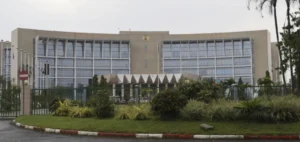The Iraqi oil minister hoped on Wednesday to reach an agreement soon allowing the resumption of crude oil exports to Turkey from the autonomous region of Kurdistan, interrupted for more than a month due to an old legal dispute.
Iraq had filed an arbitration case against neighboring Turkey at the International Chamber of Commerce in Paris in 2014, as Ankara had long imported oil from the autonomous region of Iraqi Kurdistan without the approval of federal authorities in Baghdad.
But this year the arbitration tribunal finally gave its verdict, giving reason to the Iraqi government and obliging Turkey to pay compensation to the Iraqi state. In the wake of this, Ankara had suspended imports from Iraqi Kurdistan. In early April, however, Baghdad and the local authorities of Iraqi Kurdistan signed a “temporary” agreement settling certain points of contention and agreeing on an export mechanism that would be supervised by the federal government, even though certain questions remain unresolved.
“Regarding the agreement with Iraqi Kurdistan, within a week or two maximum we will reach a final agreement for the resumption of crude exports,” hoped Wednesday the Minister of Oil Hayan Abdel Ghani, assuring that the “indicators were positive. Speaking at a conference of the “Iraq Forum”, organized by Iraqi think tanks and research institutes, he mentioned in particular “tests conducted on the Turkish side of the pipelines”, to avoid potential oil leaks, after the deadly and devastating earthquake that hit Turkey in February.
Under the terms of the agreement announced in early April, oil sales from Kurdistan must now go through the Iraqi State Oil Company (Somo), not exclusively through local Kurdish authorities. In addition, the revenues from Kurdish exports will be paid into an account managed by the local authorities in Kurdistan and supervised by Baghdad.
Kurdistan has long exported some 450,000 barrels per day (bpd) to Turkey, paying Ankara much higher transit fees than necessary, in defiance of federal government opposition. Oil is the cornucopia of both Baghdad and Iraqi Kurdistan. Iraq is the second largest country in the Opec and exports an average of 3.3 million barrels of crude oil per day. And gross income accounts for 90% of its revenue.






















